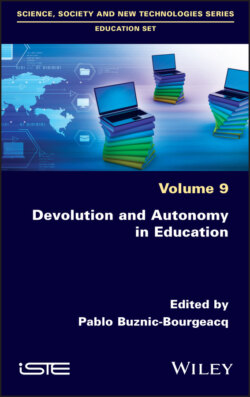Читать книгу Devolution and Autonomy in Education - Группа авторов - Страница 17
1.2. Problematization; subjects and objects of devolution: educating and disciplining 1.2.1. Objects of devolution and disciplines
ОглавлениеSince its introduction in didactics of mathematics, the concept of devolution has been given a variety of objects. Guy Brousseau, for example, envisaged it in the form of stages of devolution (Brousseau 1998): devolution of the rules of the game, the finality of the game, the cause and effect link, the anticipation of the solution, the formulation and so on (Brousseau 1998). If we set aside for a while the temporality underlying this diversity, we then find ourselves faced with the multiplicity of what can be devolved in a teaching relationship. We can then immediately see that “making people accept responsibility for a learning situation (adidactic) or a problem”, to use the original formula of devolution (Brousseau 1988, p. 325), is to make people accept many things, sometimes heterogeneous. Between accepting responsibility for the rules of the game for learning and responsibility for the formulation of knowledge, or even for the flavor of knowledge (Astolfi 2008), there is a world of difference. If we step outside the Brousseau-type frameworks and formulations, or even their mathematical background, the extent and polymorphism of what can be transferred under the responsibility of the learner becomes even more monumental. If only from an epistemological point of view, the object of devolution can navigate from the empirical sensitivity of the experimental scientist to the bodily sensation of the top athlete, from the controversial approach of the analytical philosopher to the creative attitude of the impressionist artist, from the political commitment of the critical sociologist to the meaningful listening of the psychoanalyst and so on. In order to better grasp the diversity of the objects of devolution, it would seem judicious to cross a few disciplines. This is what this book proposes, particularly in its first part, where researchers circumscribe the objects of devolution attached to specific disciplinary sensibilities. For example, Jean-Philippe Georget, from mathematics, recalls the place of debate and the social aspect of evidence in the discipline and shows that they can also be devolved. Faouzia Kalali moves from mathematics to the experimental sciences by precisely underlining the importance of devolving also the experimental in these disciplines and even further devolving what constitutes them: an attitude. Benjamin Delattre invites us, from PE and the crossed contribution of philosophy and physiology, to think about the devolution of a very original object: the double of the action inherent to human behaviors.
The concept of devolution is strongly attached to the specific objects it allows us to apprehend. Its didactic roots are the sign of its originality. However, being more particularly born of mathematics, it also carries with it the sensitivity of mathematics. Indeed, beyond a project of autonomy, it underlines the almost univocal connection between the situation constructed by the teacher and the knowledge that he or she aims to have constructed in relation to the responsibility of the learner engaged in this situation: “knowledge is entirely justified by the internal logic of the situation” (Brousseau 1998, p. 59). The dream of the fundamental situation, corresponding to knowledge, can be accomplished from mathematics. It has been accomplished with exemplary rigor by Guy Brousseau and his collaborators. However, this accomplishment remains more difficult, and certainly undesirable, in many other fields of knowledge. As Chantal Amade-Escot shows, for example, it finds its limits in PE: “the solution to the problem cannot be canonical […]; in physical education, in many cases, the adidactic situation (which one wishes to devolve to the students) can hardly be completely stabilized. It depends on student activity” (Amade-Escot 2006, p. 96). The analysis of the processes of devolution in a variety of disciplines is then also an invitation to better understand these disciplines as such, to better grasp their epistemological specificities. By analyzing what really deserves to be transferred in relation to the responsibility of the learners, we can surely better understand what underlies the essence of the disciplines in which this transfer takes place. To enter a discipline, to really exist in it, to become responsible for it, to assume the status of a disciple as both product and producer of the discipline, is perhaps what devolution aims to bring about.
In a way, the study of the processes of devolution in a variety of disciplines allows Yves Reuter and his team to pursue their project when they focus on thinking about disciplines from the disciplinary experiences of those who experience them by replaying them. The aim is to analyze:
The effects of disciplinary operations. It is a question of […] understanding the ways in which students exist in the disciplines, i.e. their different ways of being, feeling and positioning themselves […] in these spaces of teaching and learning and, in addition, understanding what they get out of them and what remains for them (Reuter 2014, p. 58).
What is left for a subject with a background in mathematics, literature or geography? Surely more than a formalized and formalizable knowledge, perhaps, in fact, what has really been devolved to it.
